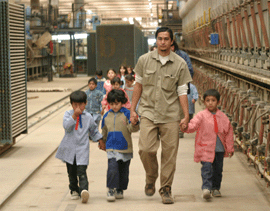As the largest recuperated factory in Argentina, occupied since 2001, Zanon now employs 470 workers. The long term demand at Zanon is for national expropriation under worker control. However, the workers from Zanon have fought a parallel battle in federal court to legally recognize the FaSinPat cooperative. In October 2005, the FaSinPat cooperative won a legal dispute, pressuring federal courts to legally recognize the FaSinPat as a legal entity that has the right to run the cooperative for one year.
FaSinPat’s Legal battle
"The workers built this factory." COMMUNITY "All of us defend the factory." DIGNITY "We’ve put the plant back into production." PRODUCTION "We’ve created more than 250 jobs." WORK "Today, the factory is at the service of the community." SOLIDARITY "Zanon belongs to the people, join us."
As part of the campaign for the definitive expropriation of FASINPAT, Zanon workers produced a television commercial inviting viewers to participate in the march. For the rally, Zanon workers stopped production and brought trucks carrying machinery out into the streets to show senators and the community what the workers have achieved in their factory. The FaSinPat cooperative has presented a legal proposal, backed by 17,000 signatures, requesting the definitive expropriation of the factory.
Alejandro Lopez, a Zanon worker said the cooperative needs a permanent solution after four years of worker control. "Soon in October the cooperative’s legality expires. We don’t want to go back to the old story of eviction threats and put the new jobs we’ve created under worker management at risk. Even with everything we’ve accomplished the provincial and national government hasn’t listened to us. We’re organizing a different kind of rally. We want the senators and community to get to see what worker management looks like. All they see when they drive by on the highway is a factory, but Zanon is much more than a factory."
Production is political

Many workers say the legal status of the cooperative has allowed the cooperative to catch an edge on the market by to getting rid of middlemen. Currently, the FaSinPat cooperative is invoicing all sales, purchases and payments with legal status. In June the plant produced over 400,000 square meters of ceramic tile, a record for the factory since the take over in 2001. "Quality control is the responsibility of all the workers," said the plant’s production coordinator, Francisco Murillo who has worked at Zanon for 15 years. The factory has competed successfully within the domestic market which is growing. The Zanon ceramics plant is one of Latin America’s largest and modern tile factory. While the former owner Luis Zanon exported over 80 percent of the factory’s production, the FaSinPat cooperative has marketed high quality and low price products to markets locally and nationally.
Murillo said that increasing production hasn’t been easy due to the lack of government support and capital investments. "In 4 years of worker management we went from producing 15,000 square meters per month to over 400,000 square meters in a factory that was equipped to produce one million square meters per month. But we’re producing in a factory that was run down due to neglect and lack of maintenance by the former owner." He adds that the Zanon workers have done what bosses aren’t interested in doing: creating jobs and support community projects. "Now that we’ve increased production, improving quality and production output will become easier. Part of the profits are being put towards creating new jobs, improve machinery and replacements for the machines. The other part of profits generated are being put towards society."
Democratic social relations
Under worker control, no management or professional stayed at the factory. The workers not only had to re-learn the process of production but also other traditionally administrative areas like sales, book keeping and production planning.
Carlos Saavedra, a Zanon worker with over 10 years laboring on the glazing sector says that every worker in the plant has equal standing. "For the workers the decisions should be decided by the assembly as the only authority in the factory. It shouldn’t be like the old administrative system with managers, unionists or one delegate who decides what is to be done." At Zanon every worker is paid the same wage, with the exception of a small pay difference based on seniority, but seniority based on who withstood the old boss, firings, stand off and occupation.
The workers at Zanon have developed a coordinator system to organize production and basic functioning. Each production line forms a commission. Each commission votes on a coordinator that rotates regularly. The coordinator of the sector informs on issues, news and conflicts within his or her sector to a assembly of coordinators. The coordinator then reports back to his or her commission news from other sectors. The workers hold weekly assemblies per shift. The factory also holds a general assembly, during which production is halted.
On the day of the rally, the cooperative held its monthly general assembly. The assembly began at 6am, long before dawn during Neuquen’s winter. Some 400 workers huddled into the
factory’s tool and die shop to discuss aspects of worker self-management. The assembly began with an evaluation of the TV commercials produced by Zanon workers developing an audiovisual area. Every month the bookkeeping coordinator gives an extensive report on the income and expenditures at the plant. During the assemblies workers decide how profits should be used. This month, the assembly voted on a pay bonus workers went beyond the production quota goal for June. Workers also voted in favor of hiring 15 new workers. Who will get the job is decided on a criteria based on family needs, political commitment to the struggle and technical experience. One participant also brought up the possibility of workers rotating to explore other areas of worker management.
The assembly concluded with the political aspects of "gestión obrera" (worker management). Zanon invited representatives from a wide range of labor conflicts nationwide. Zanon workers have remained true to their roots by building a network of mutual support with other worker conflicts and recuperated enterprises. Mercedes Mendez, a nurse from Garrahan, Argentina’s largest public children’s hospital spoke during the assembly and address the importance worker self-management has for Argentina’s workers. "It’s very moving to visit the factory. You have worked so that the entire working class feels that Zanon belongs to them. We hope you win the expropriation of the plant so that the factory can remain at the service of the community."
Producing for the community
 Besides producing ceramics the factory has committed itself to projects like donating ceramics to community centers, building homes for working class families, hosting student field trips and printing ceramic alphabets for schools. During an interview with Omar VillaBlanca, we were interrupted by a phone call from a public school teacher coordinating a visit to the factory. "One of our slogans is that we have opened our doors to the community. We bring the school children to visit to find out for themselves what a factory in production looks like and so they know they can build another kind of society." In the press office at the factory, the walls are lined with thank you posters hand-made by grade school students. For many students visiting Zanon is a curious and moving experience. VillaBlanca said that the students usually ask a long list of questions. "The first question they ask is, why isn’t there a boss?" The school visits have served as an outreach tool because most of the students talk about their visit with their families at the dinner table.
Besides producing ceramics the factory has committed itself to projects like donating ceramics to community centers, building homes for working class families, hosting student field trips and printing ceramic alphabets for schools. During an interview with Omar VillaBlanca, we were interrupted by a phone call from a public school teacher coordinating a visit to the factory. "One of our slogans is that we have opened our doors to the community. We bring the school children to visit to find out for themselves what a factory in production looks like and so they know they can build another kind of society." In the press office at the factory, the walls are lined with thank you posters hand-made by grade school students. For many students visiting Zanon is a curious and moving experience. VillaBlanca said that the students usually ask a long list of questions. "The first question they ask is, why isn’t there a boss?" The school visits have served as an outreach tool because most of the students talk about their visit with their families at the dinner table.
One of the keys to Zanon’s success has been the insertion of the workers’ struggle into the community. According to VillaBlanca the workers have a lot more at risk than a factory. "First all the jobs are at play, secondly the community work we’ve developed wouldn’t be possible. Also we’d lose an experience developed over five years that has become very valuable for workers nationally and internationally."
The Zanon workers insist that demanding the definitive exploration of the plant isn’t a utopia. Provincial governments have expropriated over 150 businesses abandoned by their owners and taken over by the workers since Argentina’s financial meltdown in 2001. The Zanon workers are planning future rallies and festivals in Buenos Aires before the legality of the FASINPAT cooperative expires.
Marie Trigona forms part of Grupo Alavío, direct action and video collective. The group has produced a number of documentaries about Zanon. For more information visit www.obrerosdezanon.org and www.agoratv.org. Marie Trigona can be reached at [email protected]
